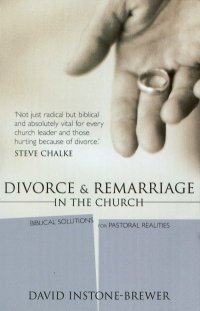

|
Questions & Replies about
Divorce and Remarriage | ||

|
Pastoral support doesn't really work by email, so if you need this, I'd encourage you to find a local fellow Christian or minister. Their personal views on this subject don't matter too much if they are good at listening, both to you and to God. David Instone-Brewer |

|
| Emailed question/comment: | ||
I have just read your book, Divorce and Remarriage in the Church. I'm currently seeking divorce in order to escape an emotionally abusive wife, and I have a question. She is saying that she will fight a divorce petition that quotes her unreasonable behaviour, because she is still completely in denial about it all. It would be so much easier and peaceful to go along with a no-fault divorce, but you mention in your book that it appears to be wrong to attempt a "no fault" divorce as a Christian. However, didn't Joseph plan to divorce Mary quietly although he had (it seemed) very clear grounds for a big noisy divorce? |
||
Reply: | ||
|
You have a very good point, which I have not thought about enough. In effect you are saying that your divorce would be based on a fault which can be regarded as a biblical ground (ie emotional abuse) but that this fault would not be cited in the legal proceedings. This is roughly the logic which I assume lay behind Paul's conclusion in 1Cor.7.15 when he said that the person was "no longer bound" - ie free to remarry. The person in question had been divorced against their will by the Roman divorce-by-separation, which Paul regarded as non-biblical. When a woman in Corinth did this, Paul told her to try and reverse it (v.10-11), but when it was done against a believer by a non-believer (ie someone whom Paul couldn't order to return to their spouse), Paul says the abandoned person is free. In other words, when someone was abandoned against their will, using a non-fault divorce, Paul allowed this to be regarded as a biblical divorce on the grounds of abandonment, even though abandonment was not cited in any legal process. I would conclude from this that God is not so much interested in the human legal processes, but he is concerned that we try, as far as we are able, to keep our side of the marriage vows, and forgive (as long as we are able) the failure of our spouse to keep those same vows. But in the end, the wronged partner has a right to call a halt to a broken marriage, whatever is actually cited in court. |
||
Read more emails & replies... | ||
Version
-for ministers
-for academics
-for everyone
Summary
Reviews